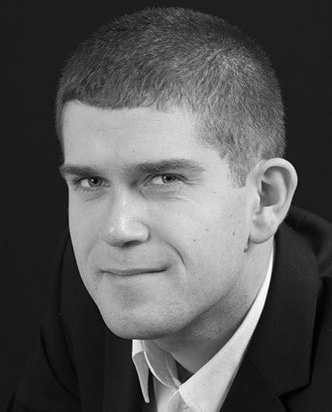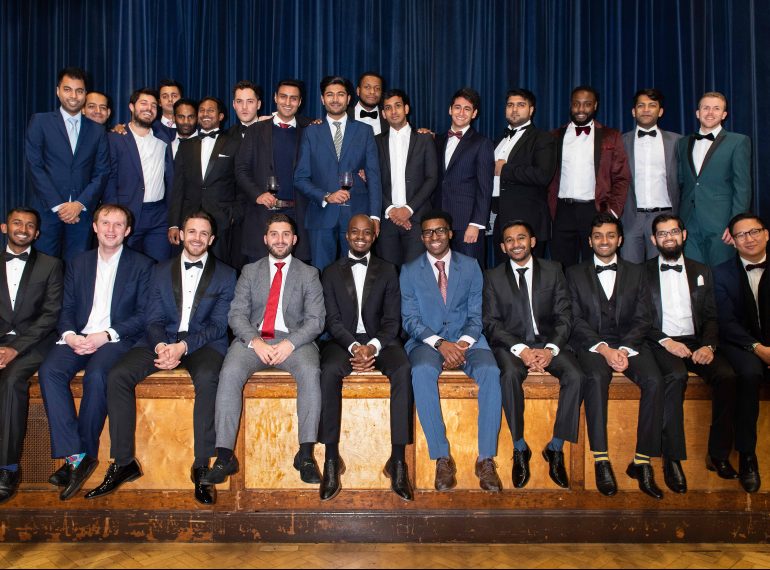
The 123rd Old Elizabethans Association Annual Dinner brought together old boys of all eras for an evening offering both formality and fun.
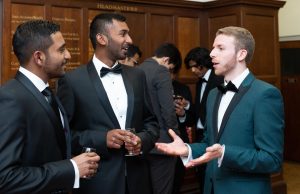 The evening featured the customary speeches and time-honoured toasts, but there was also opportunity aplenty for alumni to chat with old classmates and strike up new friendships in a relaxed and convivial environment.
The evening featured the customary speeches and time-honoured toasts, but there was also opportunity aplenty for alumni to chat with old classmates and strike up new friendships in a relaxed and convivial environment.
As is usual at the dinner, there was a particularly strong turnout from the ‘ten-year leavers’ – those who started in Year 7 in 2002 and will therefore mark ten years since they left the School in summer 2009 at the end of this academic year.
Guest speaker Alan Ingham (OE 1987–1994) entertained his fellow alumni with his recollections of School life during an era of great international uncertainty, recounting the confident prediction of one teacher that the Berlin Wall would not fall in his lifetime – just months before it did.
Ala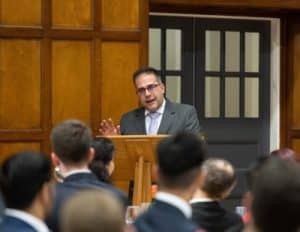 n, a senior software developer with electronic trading company Nex Group, attended with his fiancée, Ana Maria Soler Castells, whom he was marrying on the following day. He had, therefore, been very busy in the run-up to the dinner, he said, but added that the resilience one learns as a QE boy had stood him in good stead as he strove to cope with these competing demands!
n, a senior software developer with electronic trading company Nex Group, attended with his fiancée, Ana Maria Soler Castells, whom he was marrying on the following day. He had, therefore, been very busy in the run-up to the dinner, he said, but added that the resilience one learns as a QE boy had stood him in good stead as he strove to cope with these competing demands!
Reflecting on the evening afterwards, Headmaster Neil Enright said: “There was a lovely atmosphere at this dinner – a reflection, I am sure, of the increasing connections being made by our alumni both with each other and with the School.
“We are always keen to welcome alumni here and I know many OEs value the opportunity to visit, to see what has changed and often to check out who among their old teachers are still here. Many also take time during such visits to reflect on what they have gained in life by being a pupil at QE, and it is this appre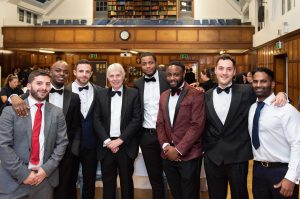 ciation which is driving so many to volunteer to help current boys and give something back.”
ciation which is driving so many to volunteer to help current boys and give something back.”
In his speech on the evening itself, the Headmaster began by welcoming all the guests: “Tonight is an opportunity for reflection, reconnection and celebration.”
Mr Enright reserved a special welcome the ten-year leavers, the class of 2002-2009 (or 2002-2007 for those who did A-levels elsewhere). They were, he said, a “fun, friendly and very successful cohort”, noting that they had started at QE on Monday 2nd September 2002, thus coinciding with his own arrival as a young teacher.
Those from this group who attended the dinner included Commonwealth Games triple-jump finalist Nathan Fox and George ‘the Poet’ Mpanga, the high-profile spoken-word artist who spoke 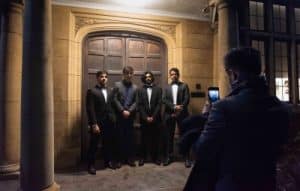 in front of the Queen on Commonwealth Day and who performed a specially commissioned poem as part of the international TV coverage of Prince Harry and Meghan Markle’s wedding.
in front of the Queen on Commonwealth Day and who performed a specially commissioned poem as part of the international TV coverage of Prince Harry and Meghan Markle’s wedding.
The Headmaster outlined a number of “big themes” which are currently being considered as part of the School’s long-term development. One of them is “keeping in touch” – which includes drawing on the experience and insight of OEs to assist current boys, many of whom are the first in their families to apply to top universities or to try to enter the most competitive professions.
The formal proceedings included toasts to Queen Elizabeth II and to “the pious memory of Queen Elizabeth I” (by tradition, honoured in silence). School Captain Aashish proposed the toast to the 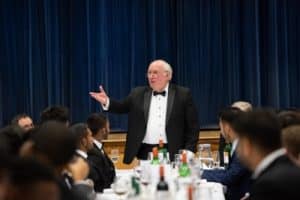 association, with the response given by the association’s Chairman, Martyn Bradish (OE 1962–1969). This was followed by the toast to the School proposed by guest speaker Alan Ingham, with the Headmaster giving the response.
association, with the response given by the association’s Chairman, Martyn Bradish (OE 1962–1969). This was followed by the toast to the School proposed by guest speaker Alan Ingham, with the Headmaster giving the response.
Association President Ken Cooper (OE 1942–1950) presented the School Captain with the Eric Shearly Memorial Prize for Outstanding Commitment. The citation noted Aashish’s “modest and quiet commitment to the life of the School.” It continued: “His talents and involvements are many and diverse; he has been a success at each stage of his academic career, attaining the top grade in every subject that he studied at GCSE and A-level, whilst also acting as form captain, colt prefect, and participating in rugby in each year group on his journey through the School. And he is an exceptional musician too!”
Aas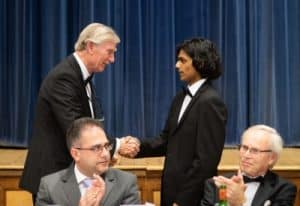 hish hopes to study Neuroscience at university and has already prepared for this by undertaking work experience in local hospitals and by examining neurological ways of treating depression in his Extended Project Qualification dissertation.
hish hopes to study Neuroscience at university and has already prepared for this by undertaking work experience in local hospitals and by examining neurological ways of treating depression in his Extended Project Qualification dissertation.
The guests enjoyed a smoked salmon rillette with pickled beetroot and pea shoots and a main course of roast belly of pork with roasted new potatoes, followed by Eton Mess for dessert, topped off with coffee and mints.

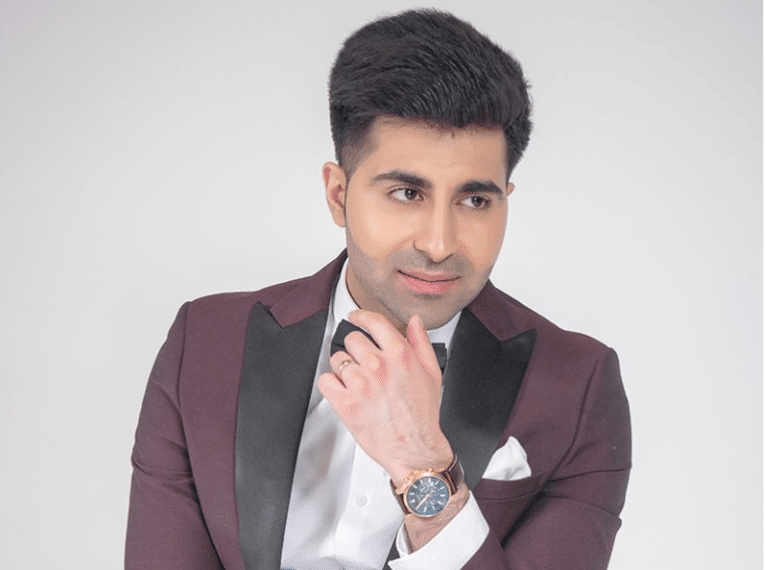
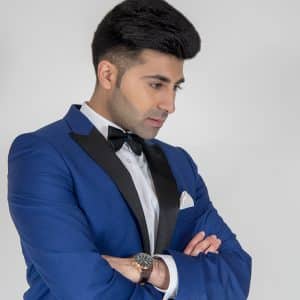 “It is about undying and everlasting love; something which is quite rare today. Igniting love is often the simple part. However, building that sustainability and strength in a relationship is extremely difficult and many people press the ‘quit’ button too soon. The Spanish lines within the chorus – ‘nunca digas adios’ (never say goodbye)’ and ‘nunca digas nunca’ (never say never) – describe never giving up on someone during a difficult period, when you know they are a diamond and worth fighting for!
“It is about undying and everlasting love; something which is quite rare today. Igniting love is often the simple part. However, building that sustainability and strength in a relationship is extremely difficult and many people press the ‘quit’ button too soon. The Spanish lines within the chorus – ‘nunca digas adios’ (never say goodbye)’ and ‘nunca digas nunca’ (never say never) – describe never giving up on someone during a difficult period, when you know they are a diamond and worth fighting for!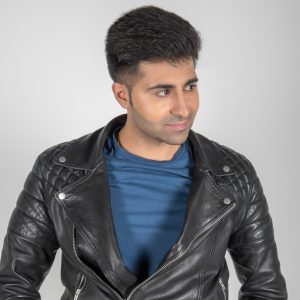 “I opted for the former because that would allow me to have a level of stability upon which the second could hopefully flourish one day.” After obtaining a first in Biomaterials Science at King’s College London and completing his MBBS and foundation training, he obtained the Registrar post at the Northern School of Radiology in Newcastle upon Tyne, where he now lives.
“I opted for the former because that would allow me to have a level of stability upon which the second could hopefully flourish one day.” After obtaining a first in Biomaterials Science at King’s College London and completing his MBBS and foundation training, he obtained the Registrar post at the Northern School of Radiology in Newcastle upon Tyne, where he now lives.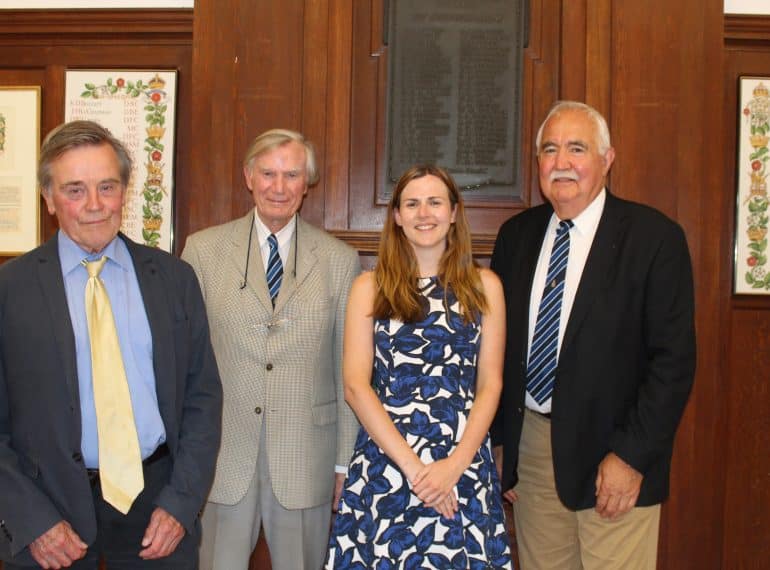
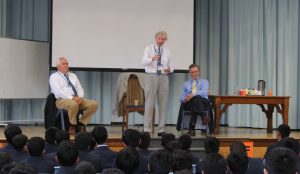 Ken Cooper (OE 1942–1950), David Farrer (1954–1961) and John Todd (1958–1964), pictured, were introduced by Head of History Helen MacGregor. They reminded the Year 7 boys working on a project about the history of the School that QE had been much smaller in the 1940s and 1950s, with a roll of only about 400-450 boys, split into four Houses, not the current six.
Ken Cooper (OE 1942–1950), David Farrer (1954–1961) and John Todd (1958–1964), pictured, were introduced by Head of History Helen MacGregor. They reminded the Year 7 boys working on a project about the history of the School that QE had been much smaller in the 1940s and 1950s, with a roll of only about 400-450 boys, split into four Houses, not the current six.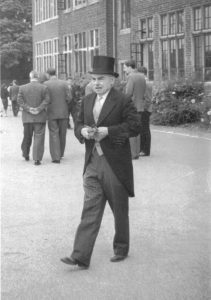 older pupil was within his rights – prefects of the time were authorised to dole out such punishments and boys were supposed to wear their caps even when not at school – the visiting alumni recalled that he was considered by his classmates to have gone too far, even by the strict standards of the day.
older pupil was within his rights – prefects of the time were authorised to dole out such punishments and boys were supposed to wear their caps even when not at school – the visiting alumni recalled that he was considered by his classmates to have gone too far, even by the strict standards of the day.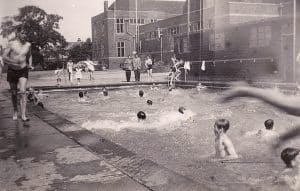 part of School life and was very popular: the best memories of many Old Elizabethans from that era are from sports on Stapylton Field, the visitors stated. The rugby and cricket were both good, and QE established a very strong reputation in athletics. Fixtures against the top public schools had been established by Mr Jenkins (pictured above), who modelled the School on such institutions during his long headmastership, which extended from 1930–1961.
part of School life and was very popular: the best memories of many Old Elizabethans from that era are from sports on Stapylton Field, the visitors stated. The rugby and cricket were both good, and QE established a very strong reputation in athletics. Fixtures against the top public schools had been established by Mr Jenkins (pictured above), who modelled the School on such institutions during his long headmastership, which extended from 1930–1961.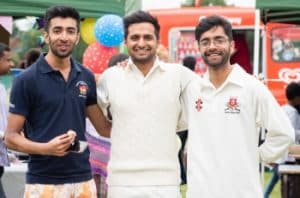 The OEs chose to bat first in the annual Stanley Busby Memorial Cricket Match, which is played on the Third Field at the rear of the School between a team of past pupils and the current School XI.
The OEs chose to bat first in the annual Stanley Busby Memorial Cricket Match, which is played on the Third Field at the rear of the School between a team of past pupils and the current School XI.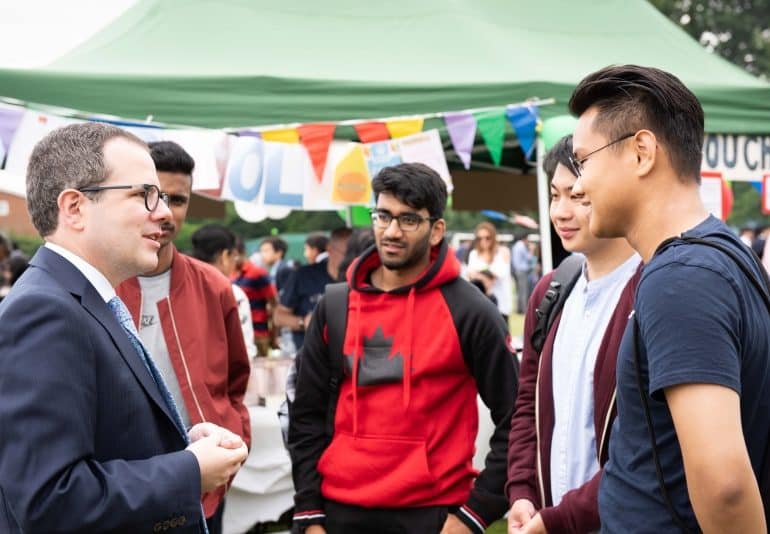
 For example, I was pleased to welcome Major Charles Russell as guest speaker on Founder’s Day and in this last week of term we are being joined by Daniel Isenberg, fulfilling a similar role at our Junior Awards Ceremony.
For example, I was pleased to welcome Major Charles Russell as guest speaker on Founder’s Day and in this last week of term we are being joined by Daniel Isenberg, fulfilling a similar role at our Junior Awards Ceremony.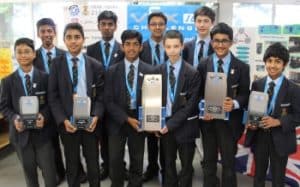 Another essential for true career satisfaction is that a job should be a good match for one’s ability. At QE, much of what we do to support boys in planning their futures focuses on helping them become aware of their own strengths. We provide extensive opportunities for boys to test their nascent career plans, whether that is: through our work experience programme; through contact with old boys in our fast-growing alumni network; through events such as this month’s Year 9 Careers Circus, or through extra-curricular activities such as the new Coding Club, the Bar Mock Trial competition and the Combined Cadet Force. Our success at the VEX IQ World Robotics Championships is a terrific example: while pupils got involved for the fun and intellectual challenge, there is clear scope for it to lead to career opportunities later in life.
Another essential for true career satisfaction is that a job should be a good match for one’s ability. At QE, much of what we do to support boys in planning their futures focuses on helping them become aware of their own strengths. We provide extensive opportunities for boys to test their nascent career plans, whether that is: through our work experience programme; through contact with old boys in our fast-growing alumni network; through events such as this month’s Year 9 Careers Circus, or through extra-curricular activities such as the new Coding Club, the Bar Mock Trial competition and the Combined Cadet Force. Our success at the VEX IQ World Robotics Championships is a terrific example: while pupils got involved for the fun and intellectual challenge, there is clear scope for it to lead to career opportunities later in life.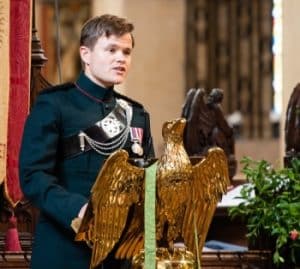 referee – and working as a volunteer for the Samaritans. On Founder’s Day, Charlie (OE 1997–2004) spoke about his own successful career as a British Army officer, which was punctuated by an attack in Helmand Province, Afghanistan, in 2010, that caused him very serious injuries. In his speech, Charlie not only explored the centrality of service to the military profession, but highlighted the role of the concept at QE. As the sad story of our 1916 School Captain in the final article of this newsletter shows, traditions of service have long been associated with the School. Moreover, they remain at the heart of what we do today, enshrined in our commitment to “developing boys’ awareness that they achieve genuine fulfilment and greater benefit by seeking to make a contribution to society rather than pursuing only personal gain”.
referee – and working as a volunteer for the Samaritans. On Founder’s Day, Charlie (OE 1997–2004) spoke about his own successful career as a British Army officer, which was punctuated by an attack in Helmand Province, Afghanistan, in 2010, that caused him very serious injuries. In his speech, Charlie not only explored the centrality of service to the military profession, but highlighted the role of the concept at QE. As the sad story of our 1916 School Captain in the final article of this newsletter shows, traditions of service have long been associated with the School. Moreover, they remain at the heart of what we do today, enshrined in our commitment to “developing boys’ awareness that they achieve genuine fulfilment and greater benefit by seeking to make a contribution to society rather than pursuing only personal gain”.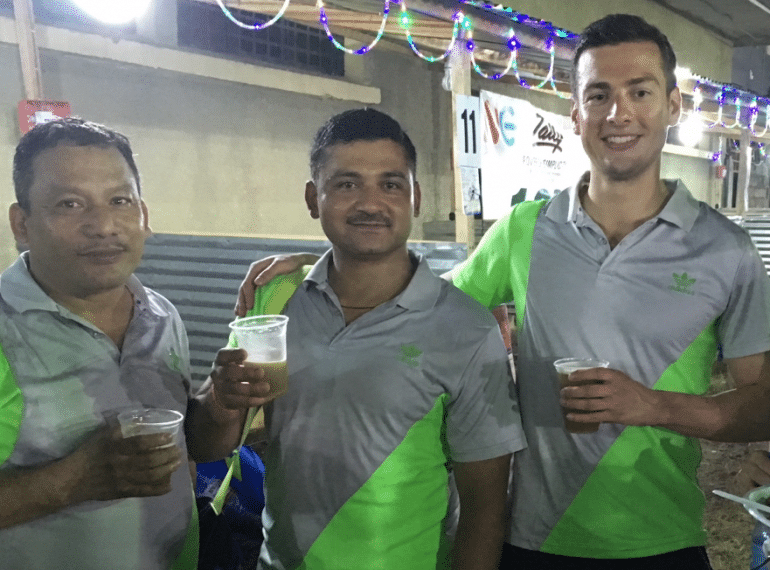
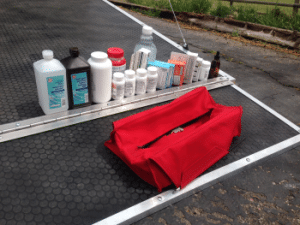 “More recently I’ve been working closely with the UN World Food Programme and other DFID partners to test how drones can be used to address humanitarian challenges, for instance by delivering critical medical aid following sudden-onset emergencies.”
“More recently I’ve been working closely with the UN World Food Programme and other DFID partners to test how drones can be used to address humanitarian challenges, for instance by delivering critical medical aid following sudden-onset emergencies.”